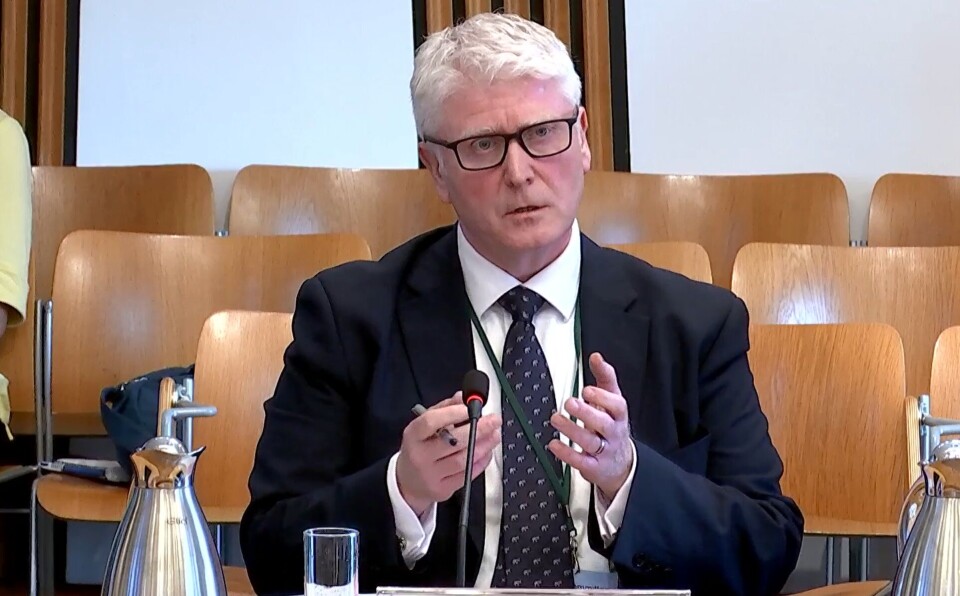
Let's spend more fish farm rent income where it's raised, says landlord
Crown Estate Scotland chief executive moves towards salmon sector's position for local use of £10m a year accrued from marine site leases
The chief executive of fish farms landlord Crown Estate Scotland (CES) has said that rural communities might benefit more if the state-owned corporation is allowed to keep more of its income instead of returning it to the Scottish Government.
Ronan O’Hara made the suggestion last week when giving evidence to the Scottish Parliament’s Rural Affairs and Islands Committee (RAIC) as part of its inquiry into salmon farming.
O’Hara’s approach is not dissimilar to that of salmon industry trade body Salmon Scotland. Since 2022, Salmon Scotland has been asking for the £10 million a year in rents that CES now collects from fish farmers to be invested in local communities.
CES initially appeared unconvinced, pointing out that from 2017 to 2021 more than £28m of its income was passed by the Scottish Government to coastal local authorities to support Covid-19 recovery projects, economic regeneration and job creation, flood protection, environmental projects, and more.
But O’Hara’s evidence to the RAIC indicates that the chief executive sees merit in more money being retained for targeted help in the areas where it was generated.
Supporting communities
Asked by MSP Karen Adam whether there are any community benefits linked to CES leases for fish farms, and whether there are calls for a community benefit mechanism (as in Norway, where communities benefit from fish farm rents), O’Hara said: “There are already arrangements in place whereby the monies go back to the communities. We view ourselves very much as serving and supporting the communities where there are assets under management.
“I would say we channel small amounts of monies into initiatives such as our Sustainable Communities Funds. We support on-the-ground initiatives to enhance community opportunities.”
Looking to the future, he said: “I would suggest, and it is at the discretion of others, that if more monies were retained by CES for reinvestment at a localised level we could potentially make that impact more meaningful, more immediate, and more visible.”
Potentially do more
When Fish Farming Expert asked CES if it could provide further details, a spokesperson said that between 2017 (when Crown Estate Scotland was established) and financial year 2021-22, it returned a total of £50.5m to the Scottish Consolidated Fund – money which the Scottish Government uses for public spending and which, in turn, supports coastal local authorities. “In addition, our Sustainable Communities Fund has, since 2020, distributed more than £1.4m to a wide range of innovative projects across the country, including 12 affordable housing projects which have together shared in more than £400,000,” added the spokesperson.
“During the recent Rural Affairs and Islands Committee evidence session on salmon farming, our chief executive Ronan O’Hara highlighted this success and suggested that if the Scottish Government was to allow Crown Estate Scotland to retain a greater portion of the revenues we generate, then we could potentially support yet more community-led initiatives which reflect the priorities of those who live and work in Scotland’s rural and coastal communities.
“Our discussions with Scottish Government are ongoing and we will continue to make the case that Crown Estate Scotland is ideally positioned to help deliver support and assistance across a range of projects in Scotland.”
Up to ministers
Salmon Scotland chief executive Tavish Scott said: “Salmon farming companies contribute millions of pounds every year to Crown Estate Scotland. This money is generated in our coastal and island communities, and we believe it should be reinvested locally.
“We’re pleased that Crown Estate Scotland chief executive Ronan O’Hara has highlighted this and now it’s up to Scottish ministers to unlock this funding.”























































